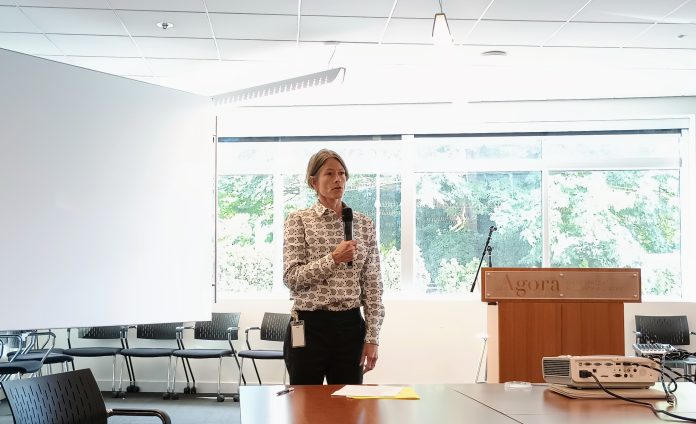
The council president’s push to slash public services instead of raise new revenue is at odds with voters.
When Argentina’s new right-wing president Javier Milei was inaugurated last month, he memorably vowed to take a “chainsaw” to the country’s public services and slash public spending.
When Sara Nelson was chosen as the new president of the Seattle City Council earlier this month, she didn’t exactly adopt Milei’s chainsaw metaphor. But in a recent Seattle Times op-ed, she made similar pledges to slash the city’s public services and spending, as well as cut taxes on big corporations.
The difference is that Milei can credibly claim a mandate for his extremist policies, having won an election openly campaigning on those plans and supported by a public ready to try something new after years of economic suffering and sky-high inflation. Nelson cannot claim a similar mandate for her right-wing economic priorities. Nelson’s new allies on the council hedged during their campaigns when asked about taxes and spending, knowing that Seattle voters are willing to tax themselves, and especially big corporations, for expansive public services. The new councilmembers instead won based on promises to address public safety concerns.
Nevertheless, Nelson’s op-ed, as well as recent personnel moves at City Hall and messages from her external allies, all indicate a deep commitment to imposing a right-wing agenda of austerity on Seattle’s public services in order to benefit her corporate donors. It’s worth taking a closer look at Nelson’s own words to see what she has in store for Seattle — and how it will likely clash with the electorate’s core values.
At the core of Nelson’s op-ed is a belief that new taxes are a bad policy solution to the city’s looming budget deficit exceeding $200 million, and that city spending has been growing too quickly.
“In addition, we must break our reliance on new revenue (taxes) to pay our bills. That’s an unsustainable fix for the wrong problem. The real problem is spending,” Nelson wrote. “According to the recent report by the City’s Revenue Stabilization Workgroup, General Fund base revenues were nearing pre-pandemic levels in 2021 and they’ve been growing faster than inflation and population since 2017.”
The belief that spending should only rise along with inflation and population growth, but no higher, is a core belief among Republicans. Seattle voters have rejected this view for decades. Instead, Seattleites have stood out for wanting a city with expansive, European-level public services, and back up this belief with their money and with their votes.
At the same election where Nelson’s allies won a majority on the City Council, Seattle voters also approved a nearly $1 billion housing levy with nearly 70% of the vote. Seattle has similarly approved levies to fund families and education, libraries, and transportation by similarly wide margins.
Seattleites also voted to create a parks district that has the power to raise its own levy without needing further voter approval, another clear sign of their support for higher taxes for great public services. Notably, Nelson raised concerns about increasing the parks levy in 2022. Though she ultimately voted for the increase, she said at the time that “the vote was the hardest decision she has made since joining the council.”
Nelson’s ideological anti-tax sentiments are out of touch with the public she represents, and this is particularly true when it comes to taxing the rich and big business. Nelson opposes the JumpStart tax on big businesses and other progressive taxes — yet the public strongly supports them. The JumpStart tax had support from nearly two-thirds of voters according to a 2021 poll. A city capital gains tax has support from 54% of Seattle voters, according to a 2023 poll.
Even when proposals to tax the rich have failed statewide, they received strong support in Seattle. Initiative 1098, which would have created an income tax on the rich, failed statewide at the November 2010 election — but passed in Seattle.
Nelson and her new friends on the City Council are well aware that their anti-tax ideology is unpopular with Seattle voters. Her endorsed candidates hedged on whether to pass new taxes to solve the city’s budget deficit. They cannot claim a mandate to slash taxes, especially taxes on businesses, particularly in light of Seattle’s longstanding support for taxes and public spending.
Because they know their plans are unpopular, Nelson and her allies are resorting to a stunning consolidation of power designed to purge City Hall of opposition to their extremist agenda. One of Nelson’s first moves as president was to fire Esther Handy, the popular and respected head of council’s independent Central Staff, replacing her with the pro-austerity Ben Noble. This removes one potential obstacle to Nelson successfully imposing a right-wing agenda of slashing taxes and spending.
Similarly, Nelson is moving to fill the vacancy on the city council (created by Teresa Mosqueda’s winning higher office) with a loyalist who she can count on to support plans to cut taxes and reduce public services. Nelson endorsed Tanya Woo for the District 2 seat in 2023 and indicated her support for Woo during last week’s winnowing of the applicant field. Like Nelson’s other council candidates, Woo hedged on taxes — and lost to Tammy Morales, a strong supporter of progressive taxation.
Nelson is not imposing her agenda alone. Her candidates got elected with help from independent expenditures funded by wealthy donors and big businesses, who now act as if they own the council themselves and have the right to do as they please with it. This attitude was shown most clearly in a notorious email sent by corporate lobbyist Tim Ceis. In the email sent to donors to the 2023 independent expenditure efforts, Ceis wrote “The independent campaign expenditure success earned you the right to let the Council know not to offer the left the consolation prize of this Council seat.”
Ceis then urged his allies to support Tanya Woo in order to help block Seattle school board director Vivian Song from getting the appointment. Ceis justified this by linking Song to labor unions and progressive candidates Ron Davis and Teresa Mosqueda, as if that disqualified her from receiving the appointment.
Here again, Nelson and her allies are out of touch with the public. Mosqueda won two citywide city council elections, and recently won election to the King County Council. Davis lost his race to Maritza Rivera, but it was very close.
More importantly, Ceis’s attitude that wealthy donors have some kind of right to decide who gets the council appointment flies in the face of Seattle’s core values — in this case, that corporate money should not influence politics. Seattle voters agreed by a large margin to tax themselves to fund the Democracy Voucher program in order to try and give grassroots candidates an added boost against corporate spending. Seattle also strongly supported Initiative 735, a statewide measure urging Congress to amend the Constitution to declare that campaign donations are not free speech — enabling campaign donations from corporations and the rich to be regulated or even outlawed.
Nelson’s ties to big business and her anti-tax austerity agenda are therefore likely to be deeply unpopular with voters, even if she ultimately has the votes to pass it in 2024. Nelson as well as Mayor Bruce Harrell would do well to look at another blue city that likes taxes and public services: New York. Eric Adams was elected mayor in 2021 and was heralded as a center-right future of the Democratic Party, with initially high approval ratings.
Since then, Adams’s approval rating has collapsed to the lowest on record for any New York mayor. While Adams faces numerous scandals and investigations, his budgets that slashed spending on libraries, schools, and other public services are a major factor in his declining popularity, with just 22% of New York voters approving of his budget policies.
Nelson is unlikely to be stopped by these kinds of facts. But Harrell might. Harrell has maintained his popularity by seeming to rise above the fray and taking a generally moderate course in office. With the mayoral election looming next year, Harrell will have to decide whether to risk his popularity and his seat by embracing Nelson’s extremist agenda — or fighting back against it.
Progressives also have a priceless opportunity to recover from successive election defeats by mobilizing against Nelson’s unpopular budget plans. Mosqueda’s council seat will be up for election in November 2024. That election could become a referendum on Nelson’s desire to slash taxes for big business and gut public spending. The battle lines are being drawn for 2024 in City Hall, and Seattle’s public services and quality of life hang in the balance — as does the fundamental question of whether we the people govern our city, or whether it’s those with the deepest pockets.
Editor’s note: Robert Cruickshank appeared on the Hacks and Wonks podcast on Friday and discussed this topic among others so listen in for more insights.

Robert Cruickshank
Robert is the Director of Digital Strategy at California YIMBY and Chair of Sierra Club Seattle. A long time communications and political strategist, he was Senior Communications Advisor to Seattle Mayor Mike McGinn from 2011-2013.
